seats MERCEDES-BENZ R320 2010 W251 Owner's Manual
[x] Cancel search | Manufacturer: MERCEDES-BENZ, Model Year: 2010, Model line: R320, Model: MERCEDES-BENZ R320 2010 W251Pages: 364, PDF Size: 7.5 MB
Page 7 of 364
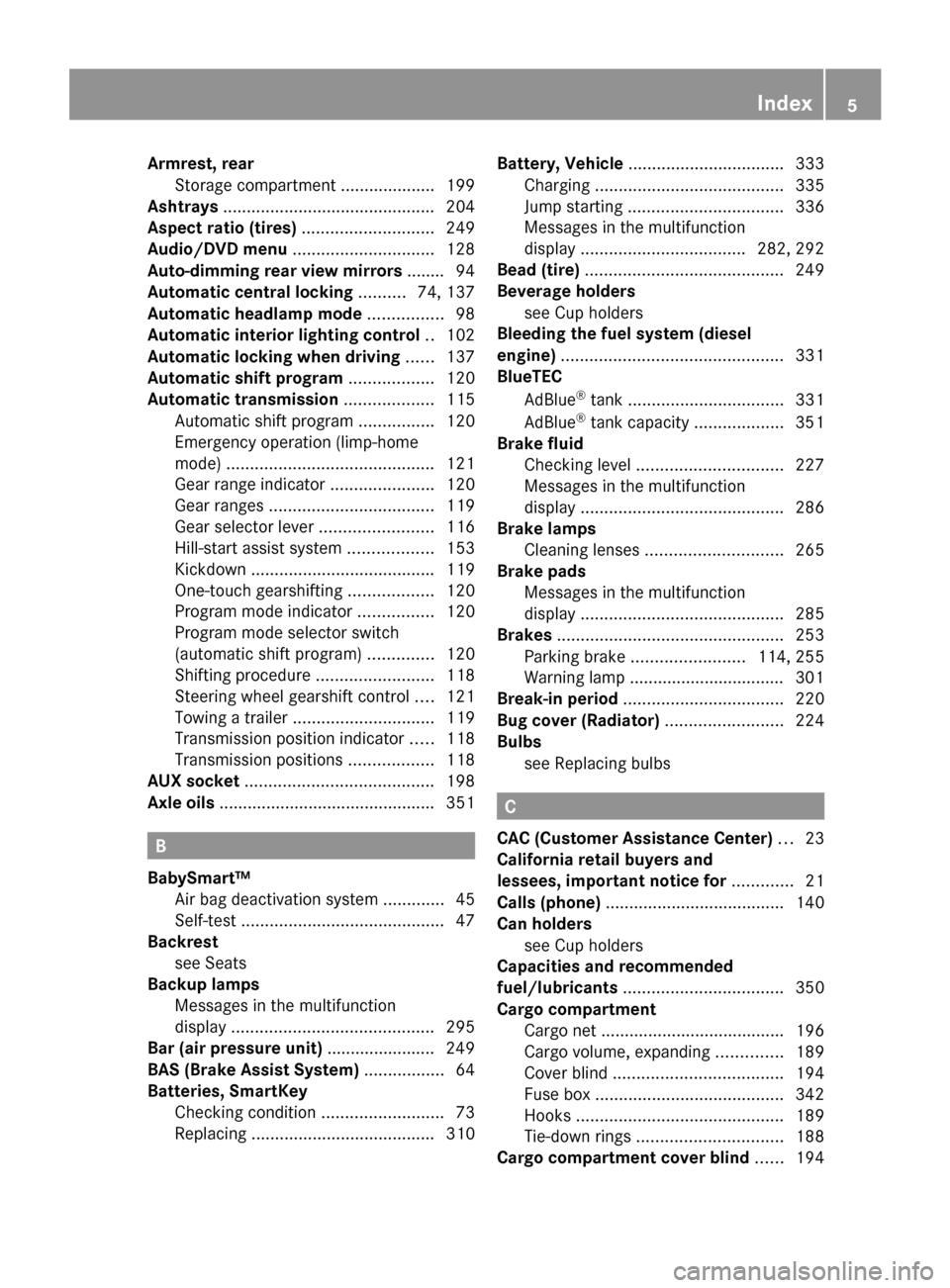
Armrest, rear
Storage compartment .................... 199
Ashtrays ............................................. 204
Aspect ratio (tires) ............................ 249
Audio/DVD menu .............................. 128
Auto-dimming rear view mirrors ........ 94
Automatic central locking ..........74, 137
Automatic headlamp mode ................98
Automatic interior lighting control ..102
Automatic locking when driving ......137
Automatic shift program ..................120
Automatic transmission ................... 115
Automatic shift program ................120
Emergency operation (limp-home
mode) ............................................ 121
Gear range indicator ......................120
Gear ranges ................................... 119
Gear selector lever ........................116
Hill-start assist system .................. 153
Kickdown ....................................... 119
One-touch gearshifting ..................120
Program mode indicator ................120
Program mode selector switch
(automatic shift program) ..............120
Shifting procedure ......................... 118
Steering wheel gearshift control .... 121
Towing a trailer .............................. 119
Transmission position indicator ..... 118
Transmission positions .................. 118
AUX socket ........................................ 198
Axle oils .............................................. 351B
BabySmart™
Air bag deactivation system ............. 45
Self-test
........................................... 47
Backrest
see Seats
Backup lamps
Messages in the multifunction
display ........................................... 295
Bar (air pressure unit) ....................... 249
BAS (Brake Assist System) ................. 64
Batteries, SmartKey
Checking condition ..........................73
Replacing ....................................... 310Battery, Vehicle
................................. 333
Charging ........................................ 335
Jump starting ................................. 336
Messages in the multifunction
display
................................... 282, 292
Bead (tire) .......................................... 249
Beverage holders see Cup holders
Bleeding the fuel system (diesel
engine) ............................................... 331
BlueTEC
AdBlue ®
tank ................................. 331
AdBlue ®
tank capacity ................... 351
Brake fluid
Checking level ............................... 227
Messages in the multifunction
display ........................................... 286
Brake lamps
Cleaning lenses ............................. 265
Brake pads
Messages in the multifunction
display ........................................... 285
Brakes ................................................ 253
Parking brake ........................ 114, 255
Warning lamp ................................. 301
Break-in period .................................. 220
Bug cover (Radiator) ......................... 224
Bulbs see Replacing bulbs C
CAC (Customer Assistance Center) ...23
California retail buyers and
lessees, important notice for .............21
Calls (phone) ...................................... 140
Can holders see Cup holders
Capacities and recommended
fuel/lubricants .................................. 350
Cargo compartment
Cargo net ....................................... 196
Cargo volume, expanding ..............189
Cover blind .................................... 194
Fuse box ........................................ 342
Hooks ............................................ 189
Tie-down rings ............................... 188
Cargo compartment cover blind ...... 194 Index
5 251_AKB; 4; 52, en-US
d2ureepe,
Version: 2.11.8.1 2009-03-23T09:22:52+01:00 - Seite 5
Page 12 of 364
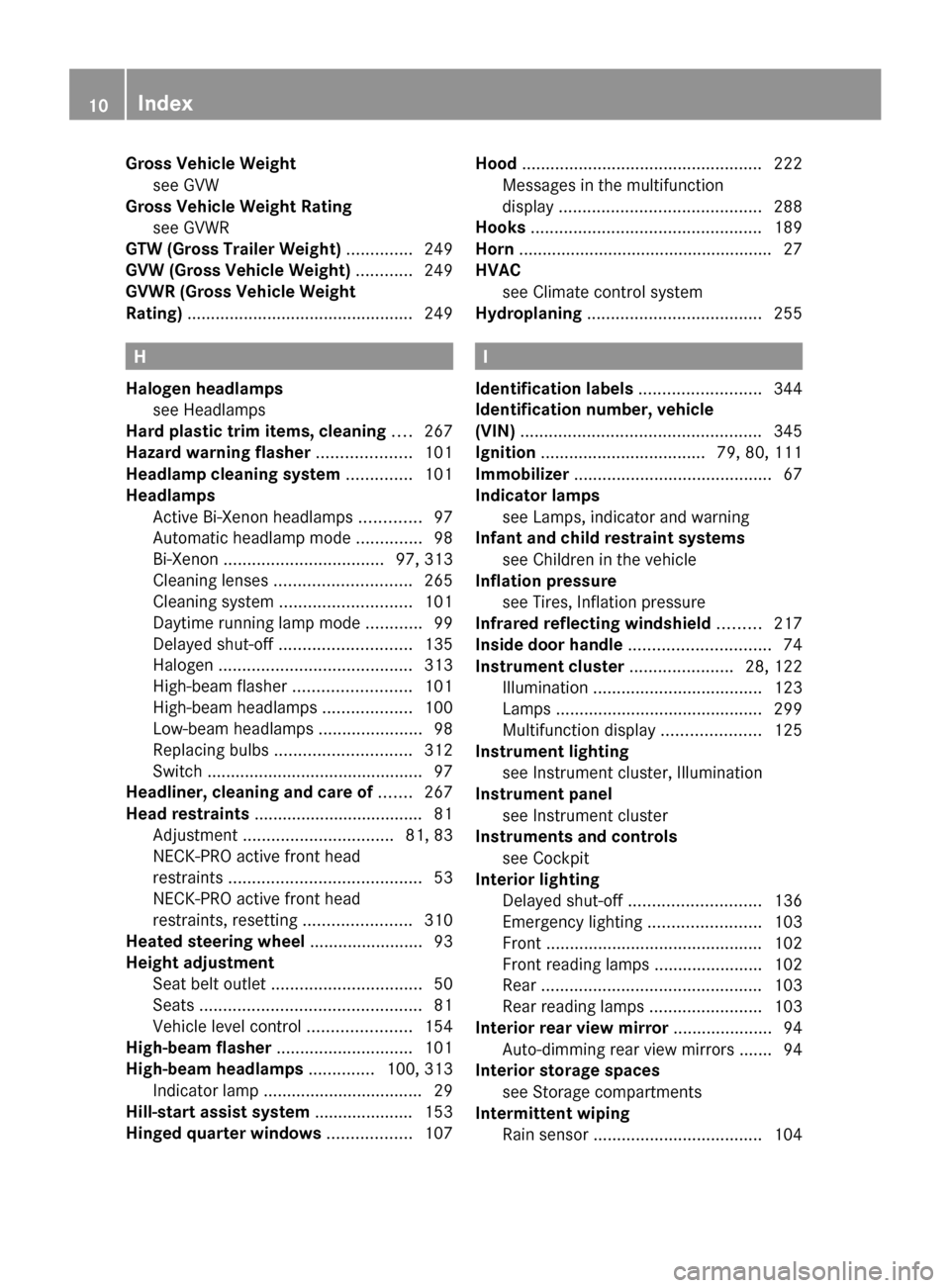
Gross Vehicle Weight
see GVW
Gross Vehicle Weight Rating
see GVWR
GTW (Gross Trailer Weight) ..............249
GVW (Gross Vehicle Weight) ............249
GVWR (Gross Vehicle Weight
Rating) ................................................ 249H
Halogen headlamps see Headlamps
Hard plastic trim items, cleaning ....267
Hazard warning flasher ....................101
Headlamp cleaning system .............. 101
Headlamps
Active Bi-Xenon headlamps ............. 97
Automatic headlamp mode .............. 98
Bi-Xenon .................................. 97, 313
Cleaning lenses ............................. 265
Cleaning system ............................ 101
Daytime running lamp mode ............99
Delayed shut-off ............................ 135
Halogen ......................................... 313
High-beam flasher .........................101
High-beam headlamps ...................100
Low-beam headlamps ...................... 98
Replacing bulbs ............................. 312
Switch .............................................. 97
Headliner, cleaning and care of .......267
Head restraints .................................... 81
Adjustment ................................ 81, 83
NECK-PRO active front head
restraints ......................................... 53
NECK-PRO active front head
restraints, resetting ....................... 310
Heated steering wheel ........................93
Height adjustment
Seat belt outlet ................................ 50
Seats ............................................... 81
Vehicle level control ...................... 154
High-beam flasher ............................. 101
High-beam headlamps ..............100, 313
Indicator lamp .................................. 29
Hill-start assist system ..................... 153
Hinged quarter windows .................. 107Hood ...................................................
222
Messages in the multifunction
display
........................................... 288
Hooks ................................................. 189
Horn ...................................................... 27
HVAC see Climate control system
Hydroplaning ..................................... 255 I
Identification labels ..........................344
Identification number, vehicle
(VIN) ................................................... 345
Ignition ................................... 79, 80, 111
Immobilizer .......................................... 67
Indicator lamps see Lamps, indicator and warning
Infant and child restraint systems
see Children in the vehicle
Inflation pressure
see Tires, Inflation pressure
Infrared reflecting windshield .........217
Inside door handle .............................. 74
Instrument cluster ......................28, 122
Illumination .................................... 123
Lamps ............................................ 299
Multifunction display .....................125
Instrument lighting
see Instrument cluster, Illumination
Instrument panel
see Instrument cluster
Instruments and controls
see Cockpit
Interior lighting
Delayed shut-off ............................ 136
Emergency lighting ........................ 103
Front .............................................. 102
Front reading lamps ....................... 102
Rear ............................................... 103
Rear reading lamps ........................ 103
Interior rear view mirror .....................94
Auto-dimming rear view mirrors ....... 94
Interior storage spaces
see Storage compartments
Intermittent wiping
Rain sensor .................................... 10410
Index 251_AKB; 4; 52, en-US
d2ureepe,
Version: 2.11.8.1 2009-03-23T09:22:52+01:00 - Seite 10
Page 16 of 364
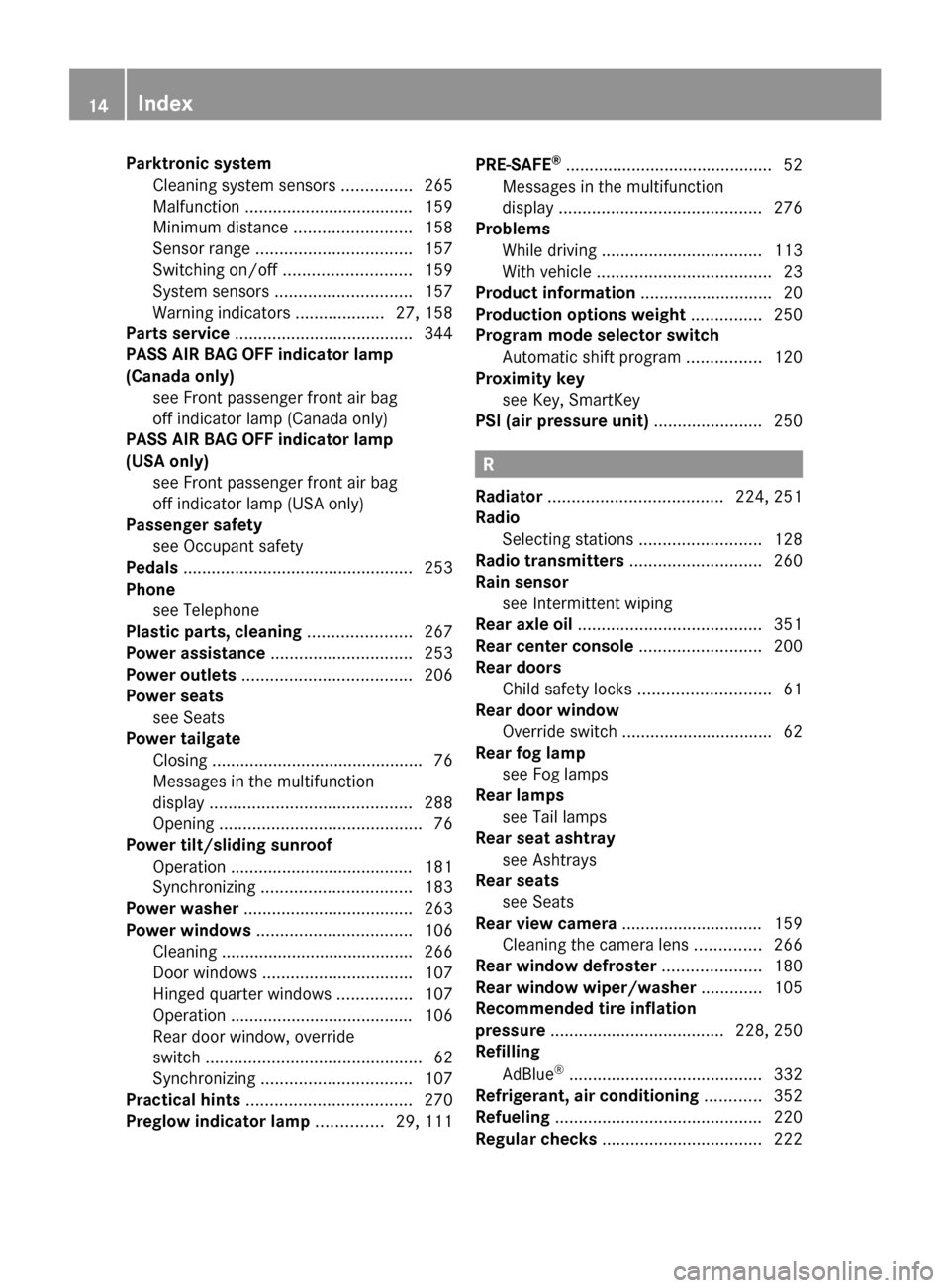
Parktronic system
Cleaning system sensors ...............265
Malfunction ....................................
159
Minimum distance ......................... 158
Sensor range ................................. 157
Switching on/off ........................... 159
System sensors ............................. 157
Warning indicators ................... 27, 158
Parts service ...................................... 344
PASS AIR BAG OFF indicator lamp
(Canada only)
see Front passenger front air bag
off indicator lamp (Canada only)
PASS AIR BAG OFF indicator lamp
(USA only)
see Front passenger front air bag
off indicator lamp (USA only)
Passenger safety
see Occupant safety
Pedals ................................................. 253
Phone see Telephone
Plastic parts, cleaning ...................... 267
Power assistance .............................. 253
Power outlets .................................... 206
Power seats see Seats
Power tailgate
Closing ............................................. 76
Messages in the multifunction
display ........................................... 288
Opening ........................................... 76
Power tilt/sliding sunroof
Operation ....................................... 181
Synchronizing ................................ 183
Power washer .................................... 263
Power windows ................................. 106
Cleaning ......................................... 266
Door windows ................................ 107
Hinged quarter windows ................ 107
Operation ....................................... 106
Rear door window, override
switch .............................................. 62
Synchronizing ................................ 107
Practical hints ................................... 270
Preglow indicator lamp ..............29, 111PRE-SAFE
®
............................................ 52
Messages in the multifunction
display
........................................... 276
Problems
While driving .................................. 113
With vehicle ..................................... 23
Product information ............................20
Production options weight ...............250
Program mode selector switch
Automatic shift program ................120
Proximity key
see Key, SmartKey
PSI (air pressure unit) ....................... 250 R
Radiator ..................................... 224, 251
Radio Selecting stations
..........................128
Radio transmitters ............................260
Rain sensor see Intermittent wiping
Rear axle oil ....................................... 351
Rear center console ..........................200
Rear doors
Child safety locks ............................ 61
Rear door window
Override switch ................................ 62
Rear fog lamp
see Fog lamps
Rear lamps
see Tail lamps
Rear seat ashtray
see Ashtrays
Rear seats
see Seats
Rear view camera .............................. 159
Cleaning the camera lens .............. 266
Rear window defroster ..................... 180
Rear window wiper/washer .............105
Recommended tire inflation
pressure ..................................... 228, 250
Refilling
AdBlue ®
......................................... 332
Refrigerant, air conditioning ............ 352
Refueling ............................................ 220
Regular checks .................................. 22214
Index 251_AKB; 4; 52, en-US
d2ureepe,
Version: 2.11.8.1 2009-03-23T09:22:52+01:00 - Seite 14
Page 17 of 364
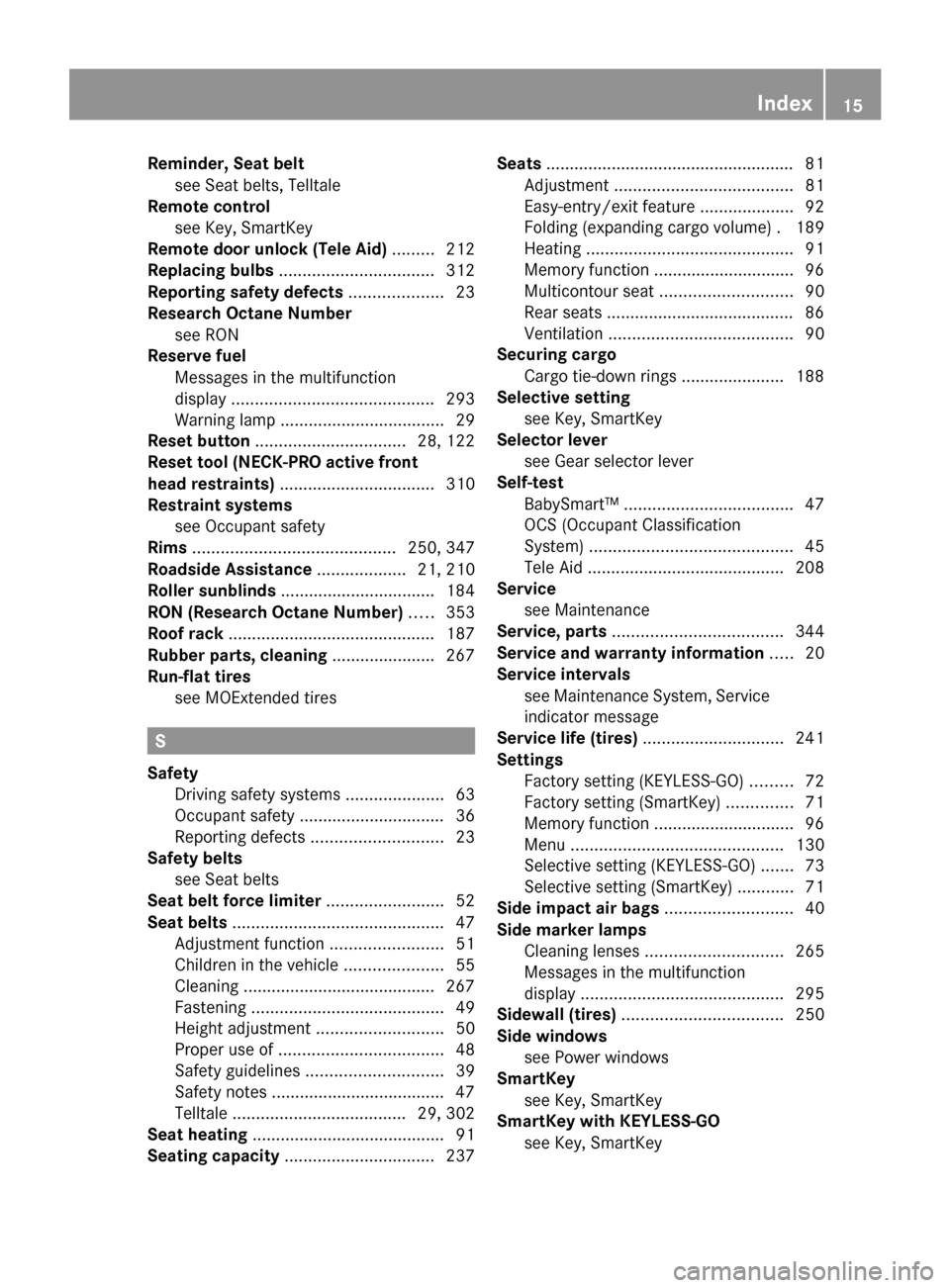
Reminder, Seat belt
see Seat belts, Telltale
Remote control
see Key, SmartKey
Remote door unlock (Tele Aid) .........212
Replacing bulbs ................................. 312
Reporting safety defects .................... 23
Research Octane Number see RON
Reserve fuel
Messages in the multifunction
display ........................................... 293
Warning lamp ................................... 29
Reset button ................................ 28, 122
Reset tool (NECK-PRO active front
head restraints) ................................. 310
Restraint systems see Occupant safety
Rims ........................................... 250, 347
Roadside Assistance ...................21, 210
Roller sunblinds ................................. 184
RON (Research Octane Number) ..... 353
Roof rack ............................................ 187
Rubber parts, cleaning ...................... 267
Run-flat tires see MOExtended tires S
Safety Driving safety systems ..................... 63
Occupant safety ...............................
36
Reporting defects ............................ 23
Safety belts
see Seat belts
Seat belt force limiter ......................... 52
Seat belts ............................................. 47
Adjustment function ........................51
Children in the vehicle .....................55
Cleaning ......................................... 267
Fastening ......................................... 49
Height adjustment ...........................50
Proper use of ................................... 48
Safety guidelines ............................. 39
Safety notes ..................................... 47
Telltale ..................................... 29, 302
Seat heating ......................................... 91
Seating capacity ................................ 237Seats .....................................................
81
Adjustment ...................................... 81
Easy-entry/exit feature ....................92
Folding (expanding cargo volume) . 189
Heating ............................................ 91
Memory function .............................. 96
Multicontour seat ............................ 90
Rear seats ........................................ 86
Ventilation ....................................... 90
Securing cargo
Cargo tie-down rings ...................... 188
Selective setting
see Key, SmartKey
Selector lever
see Gear selector lever
Self-test
BabySmart™ .................................... 47
OCS (Occupant Classification
System) ........................................... 45
Tele Aid .......................................... 208
Service
see Maintenance
Service, parts .................................... 344
Service and warranty information .....20
Service intervals see Maintenance System, Service
indicator message
Service life (tires) .............................. 241
Settings Factory setting (KEYLESS-GO) ......... 72
Factory setting (SmartKey) ..............71
Memory function .............................. 96
Menu ............................................. 130
Selective setting (KEYLESS-GO) ....... 73
Selective setting (SmartKey) ............71
Side impact air bags ...........................40
Side marker lamps
Cleaning lenses ............................. 265
Messages in the multifunction
display ........................................... 295
Sidewall (tires) .................................. 250
Side windows see Power windows
SmartKey
see Key, SmartKey
SmartKey with KEYLESS-GO
see Key, SmartKey Index
15 251_AKB; 4; 52, en-US
d2ureepe,
Version: 2.11.8.1 2009-03-23T09:22:52+01:00 - Seite 15
Page 45 of 364
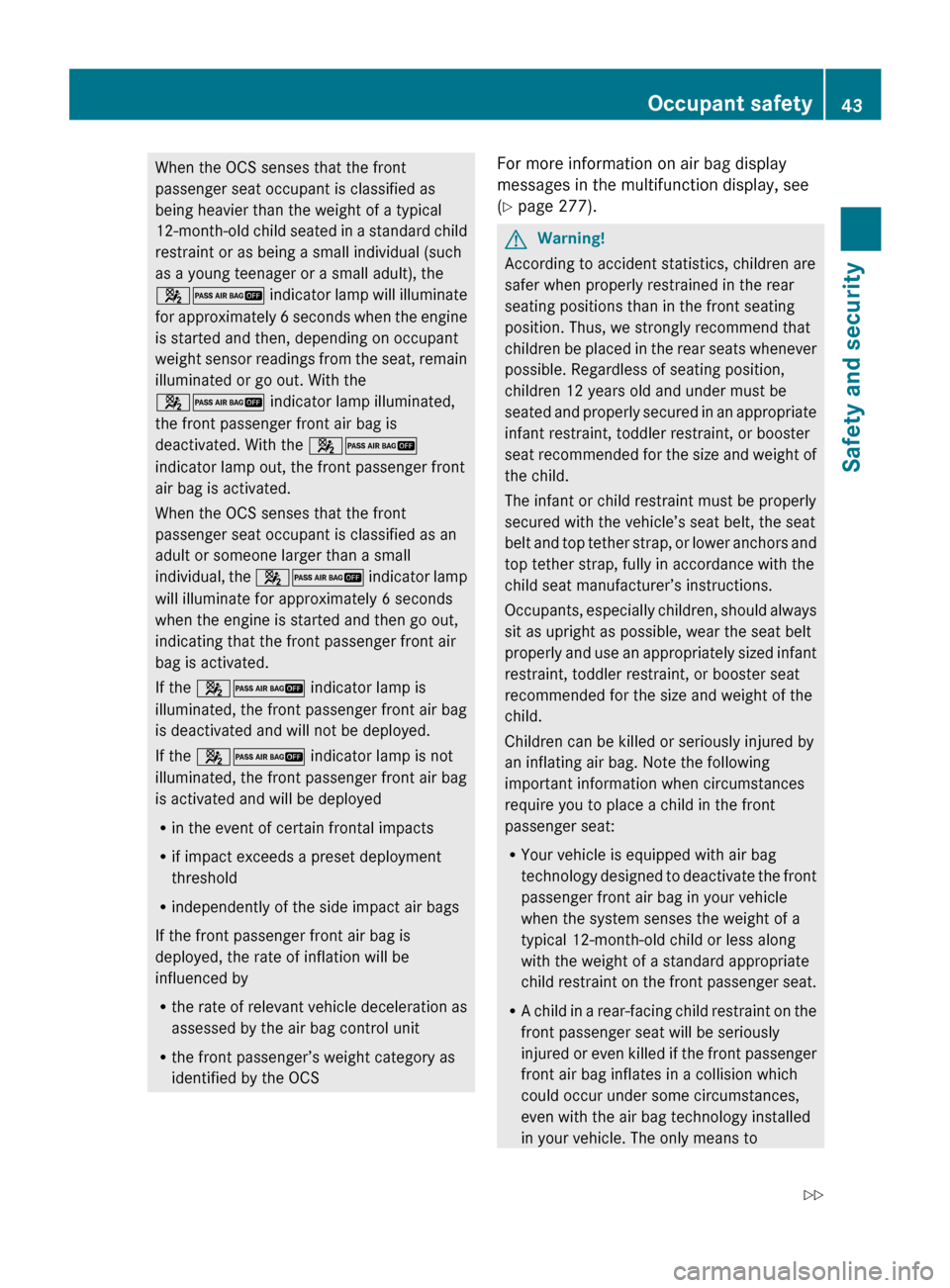
When the OCS senses that the front
passenger seat occupant is classified as
being heavier than the weight of a typical
12-month-old
child seated in a standard child
restraint or as being a small individual (such
as a young teenager or a small adult), the
42 indicator lamp will illuminate
for approximately 6 seconds when the engine
is started and then, depending on occupant
weight sensor readings from the seat, remain
illuminated or go out. With the
42 indicator lamp illuminated,
the front passenger front air bag is
deactivated. With the 42
indicator lamp out, the front passenger front
air bag is activated.
When the OCS senses that the front
passenger seat occupant is classified as an
adult or someone larger than a small
individual, the 42 indicator lamp
will illuminate for approximately 6 seconds
when the engine is started and then go out,
indicating that the front passenger front air
bag is activated.
If the 42 indicator lamp is
illuminated, the front passenger front air bag
is deactivated and will not be deployed.
If the 42 indicator lamp is not
illuminated, the front passenger front air bag
is activated and will be deployed
R in the event of certain frontal impacts
R if impact exceeds a preset deployment
threshold
R independently of the side impact air bags
If the front passenger front air bag is
deployed, the rate of inflation will be
influenced by
R the rate of relevant vehicle deceleration as
assessed by the air bag control unit
R the front passenger’s weight category as
identified by the OCS For more information on air bag display
messages in the multifunction display, see
(Y page 277). G
Warning!
According to accident statistics, children are
safer when properly restrained in the rear
seating positions than in the front seating
position. Thus, we strongly recommend that
children
be placed in the rear seats whenever
possible. Regardless of seating position,
children 12 years old and under must be
seated and properly secured in an appropriate
infant restraint, toddler restraint, or booster
seat recommended for the size and weight of
the child.
The infant or child restraint must be properly
secured with the vehicle’s seat belt, the seat
belt and top tether strap, or lower anchors and
top tether strap, fully in accordance with the
child seat manufacturer’s instructions.
Occupants, especially children, should always
sit as upright as possible, wear the seat belt
properly and use an appropriately sized infant
restraint, toddler restraint, or booster seat
recommended for the size and weight of the
child.
Children can be killed or seriously injured by
an inflating air bag. Note the following
important information when circumstances
require you to place a child in the front
passenger seat:
R Your vehicle is equipped with air bag
technology designed to deactivate the front
passenger front air bag in your vehicle
when the system senses the weight of a
typical 12-month-old child or less along
with the weight of a standard appropriate
child restraint on the front passenger seat.
R A child in a rear-facing child restraint on the
front passenger seat will be seriously
injured or even killed if the front passenger
front air bag inflates in a collision which
could occur under some circumstances,
even with the air bag technology installed
in your vehicle. The only means to Occupant safety
43
Safety and security
251_AKB; 4; 52, en-US
d2ureepe, Version: 2.11.8.1 2009-03-23T09:22:52+01:00 - Seite 43 Z
Page 47 of 364
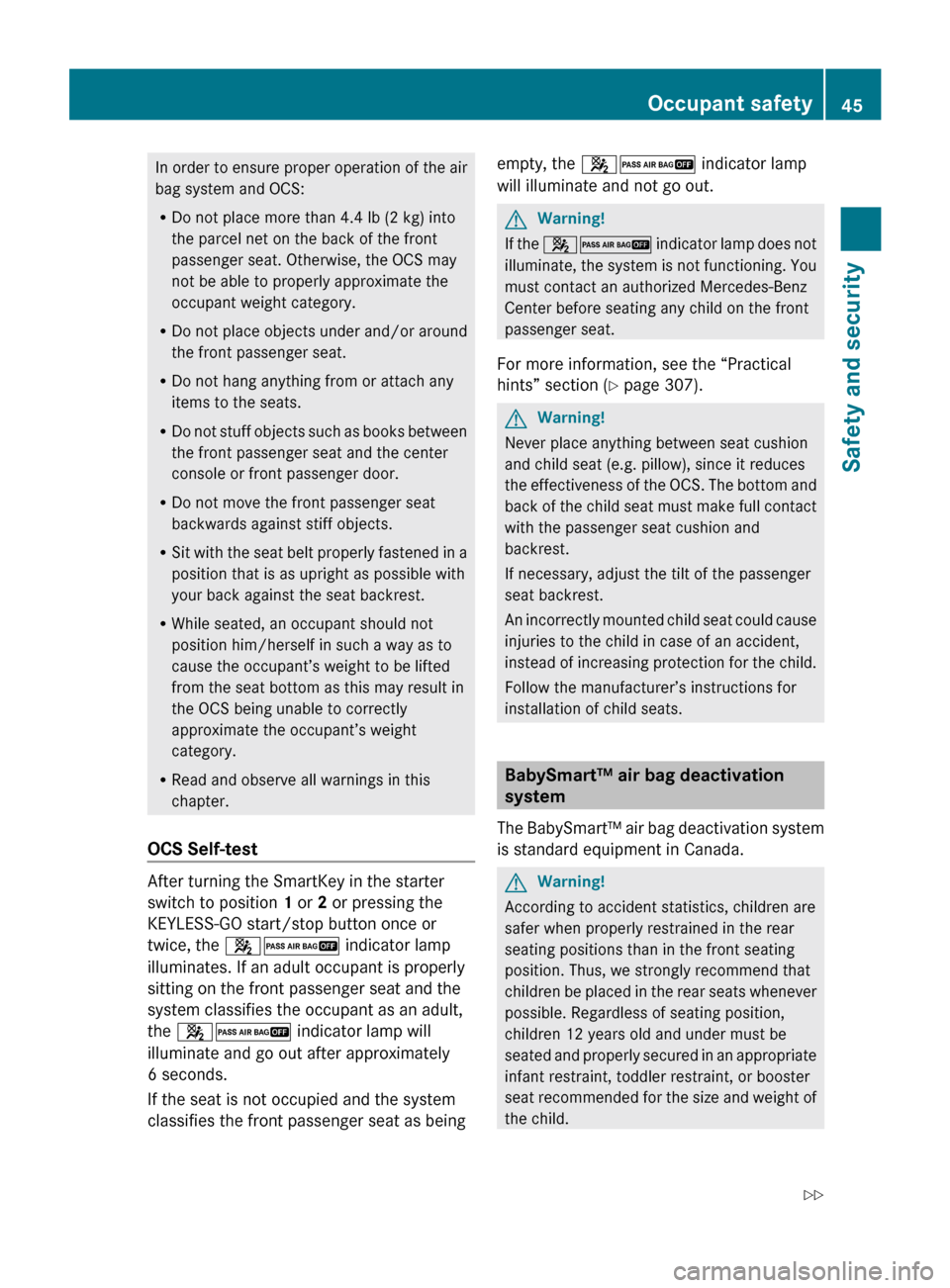
In order to ensure proper operation of the air
bag system and OCS:
R
Do not place more than 4.4 lb
(2 kg) into
the parcel net on the back of the front
passenger seat. Otherwise, the OCS may
not be able to properly approximate the
occupant weight category.
R Do not place objects under and/or around
the front passenger seat.
R Do not hang anything from or attach any
items to the seats.
R Do not stuff objects such as books between
the front passenger seat and the center
console or front passenger door.
R Do not move the front passenger seat
backwards against stiff objects.
R Sit with the seat belt properly fastened in a
position that is as upright as possible with
your back against the seat backrest.
R While seated, an occupant should not
position him/herself in such a way as to
cause the occupant’s weight to be lifted
from the seat bottom as this may result in
the OCS being unable to correctly
approximate the occupant’s weight
category.
R Read and observe all warnings in this
chapter.
OCS Self-test After turning the SmartKey in the starter
switch to position 1 or 2 or pressing the
KEYLESS-GO start/stop button once or
twice, the 42 indicator lamp
illuminates. If an adult occupant is properly
sitting on the front passenger seat and the
system classifies the occupant as an adult,
the 42 indicator lamp will
illuminate and go out after approximately
6 seconds.
If the seat is not occupied and the system
classifies the front passenger seat as being empty, the 42 indicator lamp
will illuminate and not go out. G
Warning!
If the 42
indicator lamp does not
illuminate, the system is not functioning. You
must contact an authorized Mercedes-Benz
Center before seating any child on the front
passenger seat.
For more information, see the “Practical
hints” section ( Y page 307). G
Warning!
Never place anything between seat cushion
and child seat (e.g. pillow), since it reduces
the
effectiveness of the OCS. The bottom and
back of the child seat must make full contact
with the passenger seat cushion and
backrest.
If necessary, adjust the tilt of the passenger
seat backrest.
An incorrectly mounted child seat could cause
injuries to the child in case of an accident,
instead of increasing protection for the child.
Follow the manufacturer’s instructions for
installation of child seats. BabySmart™ air bag deactivation
system
The
BabySmart™ air bag deactivation system
is standard equipment in Canada. G
Warning!
According to accident statistics, children are
safer when properly restrained in the rear
seating positions than in the front seating
position. Thus, we strongly recommend that
children
be placed in the rear seats whenever
possible. Regardless of seating position,
children 12 years old and under must be
seated and properly secured in an appropriate
infant restraint, toddler restraint, or booster
seat recommended for the size and weight of
the child. Occupant safety
45
Safety and security
251_AKB; 4; 52, en-US
d2ureepe, Version: 2.11.8.1 2009-03-23T09:22:52+01:00 - Seite 45 Z
Page 49 of 364
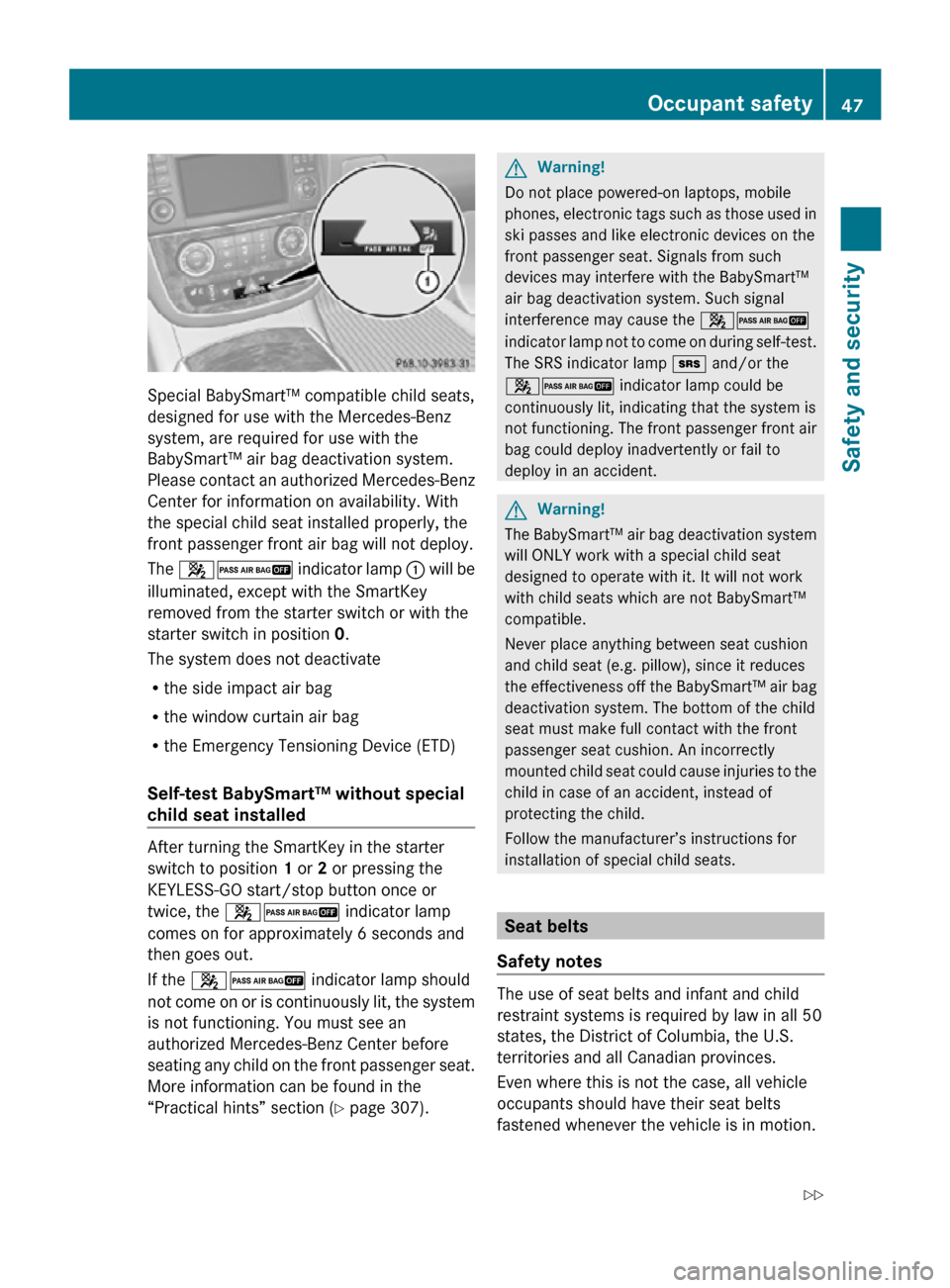
Special BabySmart™ compatible child seats,
designed for use with the Mercedes-Benz
system, are required for use with the
BabySmart™ air bag deactivation system.
Please contact an authorized Mercedes-Benz
Center for information on availability. With
the special child seat installed properly, the
front passenger front air bag will not deploy.
The
42 indicator lamp : will be
illuminated, except with the SmartKey
removed from the starter switch or with the
starter switch in position 0.
The system does not deactivate
R the side impact air bag
R the window curtain air bag
R the Emergency Tensioning Device (ETD)
Self-test BabySmart™ without special
child seat installed After turning the SmartKey in the starter
switch to position 1 or 2 or pressing the
KEYLESS-GO start/stop button once or
twice, the 42 indicator lamp
comes on for approximately 6 seconds and
then goes out.
If the
42 indicator lamp should
not come on or is continuously lit, the system
is not functioning. You must see an
authorized Mercedes-Benz Center before
seating any child on the front passenger seat.
More information can be found in the
“Practical hints” section (Y page 307). G
Warning!
Do not place powered-on laptops, mobile
phones, electronic tags such as those used in
ski passes and like electronic devices on the
front passenger seat. Signals from such
devices may interfere with the BabySmart™
air bag deactivation system. Such signal
interference may cause the 42
indicator lamp not to come on during self-test.
The SRS indicator lamp + and/or the
42 indicator lamp could be
continuously lit, indicating that the system is
not functioning. The front passenger front air
bag could deploy inadvertently or fail to
deploy in an accident. G
Warning!
The BabySmart™ air bag deactivation system
will ONLY work with a special child seat
designed to operate with it. It will not work
with child seats which are not BabySmart™
compatible.
Never place anything between seat cushion
and child seat (e.g. pillow), since it reduces
the effectiveness off the BabySmart™ air bag
deactivation system. The bottom of the child
seat must make full contact with the front
passenger seat cushion. An incorrectly
mounted child seat could cause injuries to the
child in case of an accident, instead of
protecting the child.
Follow the manufacturer’s instructions for
installation of special child seats. Seat belts
Safety notes The use of seat belts and infant and child
restraint systems is required by law in all 50
states, the District of Columbia, the U.S.
territories and all Canadian provinces.
Even where this is not the case, all vehicle
occupants should have their seat belts
fastened whenever the vehicle is in motion. Occupant safety
47Safety and security
251_AKB; 4; 52, en-US
d2ureepe, Version: 2.11.8.1 2009-03-23T09:22:52+01:00 - Seite 47 Z
Page 51 of 364
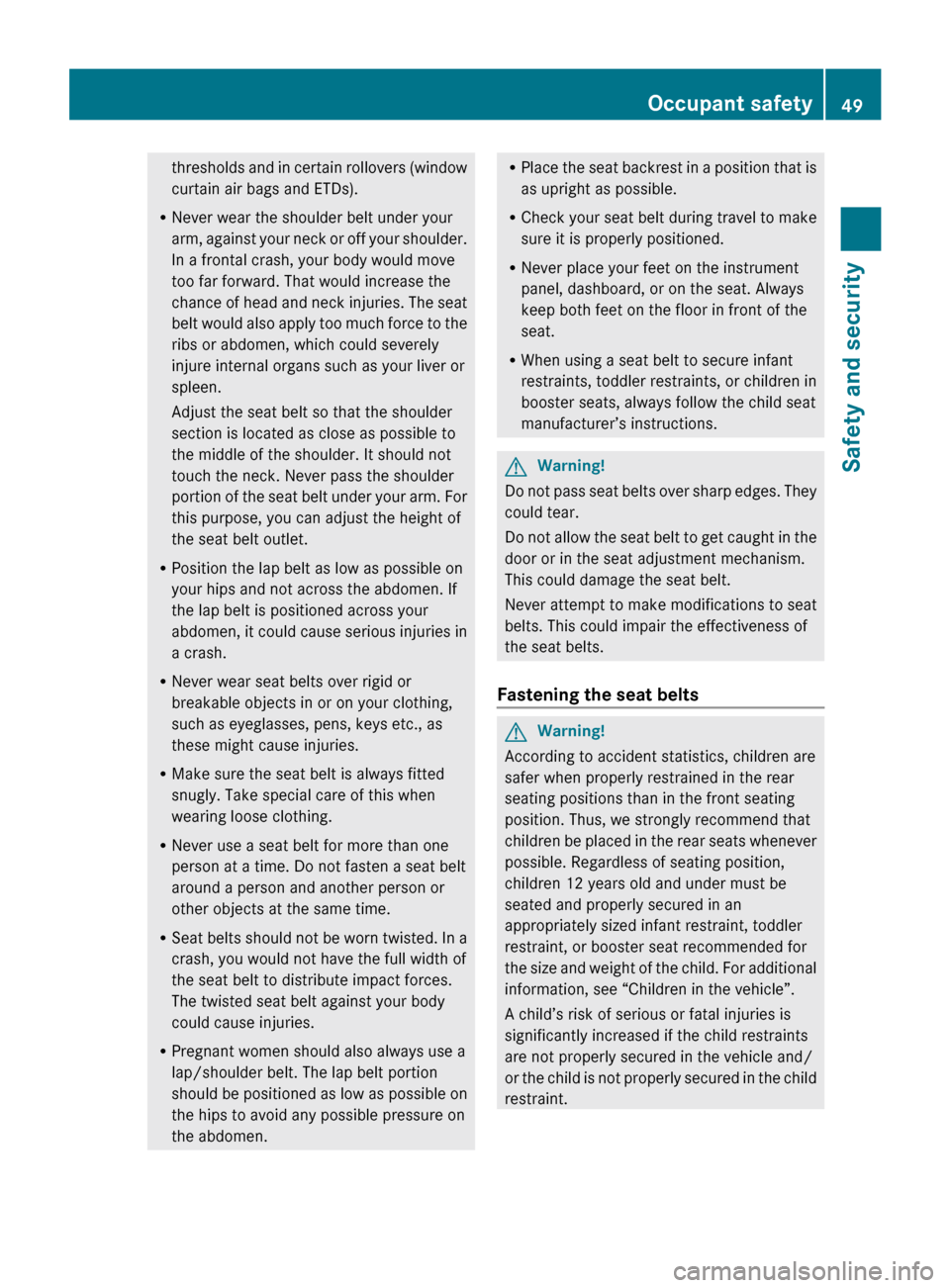
thresholds and in certain rollovers (window
curtain air bags and ETDs).
R Never wear the shoulder belt under your
arm,
against your neck or off your shoulder.
In a frontal crash, your body would move
too far forward. That would increase the
chance of head and neck injuries. The seat
belt would also apply too much force to the
ribs or abdomen, which could severely
injure internal organs such as your liver or
spleen.
Adjust the seat belt so that the shoulder
section is located as close as possible to
the middle of the shoulder. It should not
touch the neck. Never pass the shoulder
portion of the seat belt under your arm. For
this purpose, you can adjust the height of
the seat belt outlet.
R Position the lap belt as low as possible on
your hips and not across the abdomen. If
the lap belt is positioned across your
abdomen, it could cause serious injuries in
a crash.
R Never wear seat belts over rigid or
breakable objects in or on your clothing,
such as eyeglasses, pens, keys etc., as
these might cause injuries.
R Make sure the seat belt is always fitted
snugly. Take special care of this when
wearing loose clothing.
R Never use a seat belt for more than one
person at a time. Do not fasten a seat belt
around a person and another person or
other objects at the same time.
R Seat belts should not be worn twisted. In a
crash, you would not have the full width of
the seat belt to distribute impact forces.
The twisted seat belt against your body
could cause injuries.
R Pregnant women should also always use a
lap/shoulder belt. The lap belt portion
should be positioned as low as possible on
the hips to avoid any possible pressure on
the abdomen. R
Place the seat backrest in a position that is
as upright as possible.
R Check your seat belt during travel to make
sure it is properly positioned.
R Never place your feet on the instrument
panel, dashboard, or on the seat. Always
keep both feet on the floor in front of the
seat.
R When using a seat belt to secure infant
restraints, toddler restraints, or children in
booster seats, always follow the child seat
manufacturer’s instructions. G
Warning!
Do not pass seat belts over sharp edges. They
could tear.
Do
not allow the seat belt to get caught in the
door or in the seat adjustment mechanism.
This could damage the seat belt.
Never attempt to make modifications to seat
belts. This could impair the effectiveness of
the seat belts.
Fastening the seat belts G
Warning!
According to accident statistics, children are
safer when properly restrained in the rear
seating positions than in the front seating
position. Thus, we strongly recommend that
children
be placed in the rear seats whenever
possible. Regardless of seating position,
children 12 years old and under must be
seated and properly secured in an
appropriately sized infant restraint, toddler
restraint, or booster seat recommended for
the size and weight of the child. For additional
information, see “Children in the vehicle”.
A child’s risk of serious or fatal injuries is
significantly increased if the child restraints
are not properly secured in the vehicle and/
or the child is not properly secured in the child
restraint. Occupant safety
49
Safety and security
251_AKB; 4; 52, en-US
d2ureepe, Version: 2.11.8.1 2009-03-23T09:22:52+01:00 - Seite 49 Z
Page 52 of 364
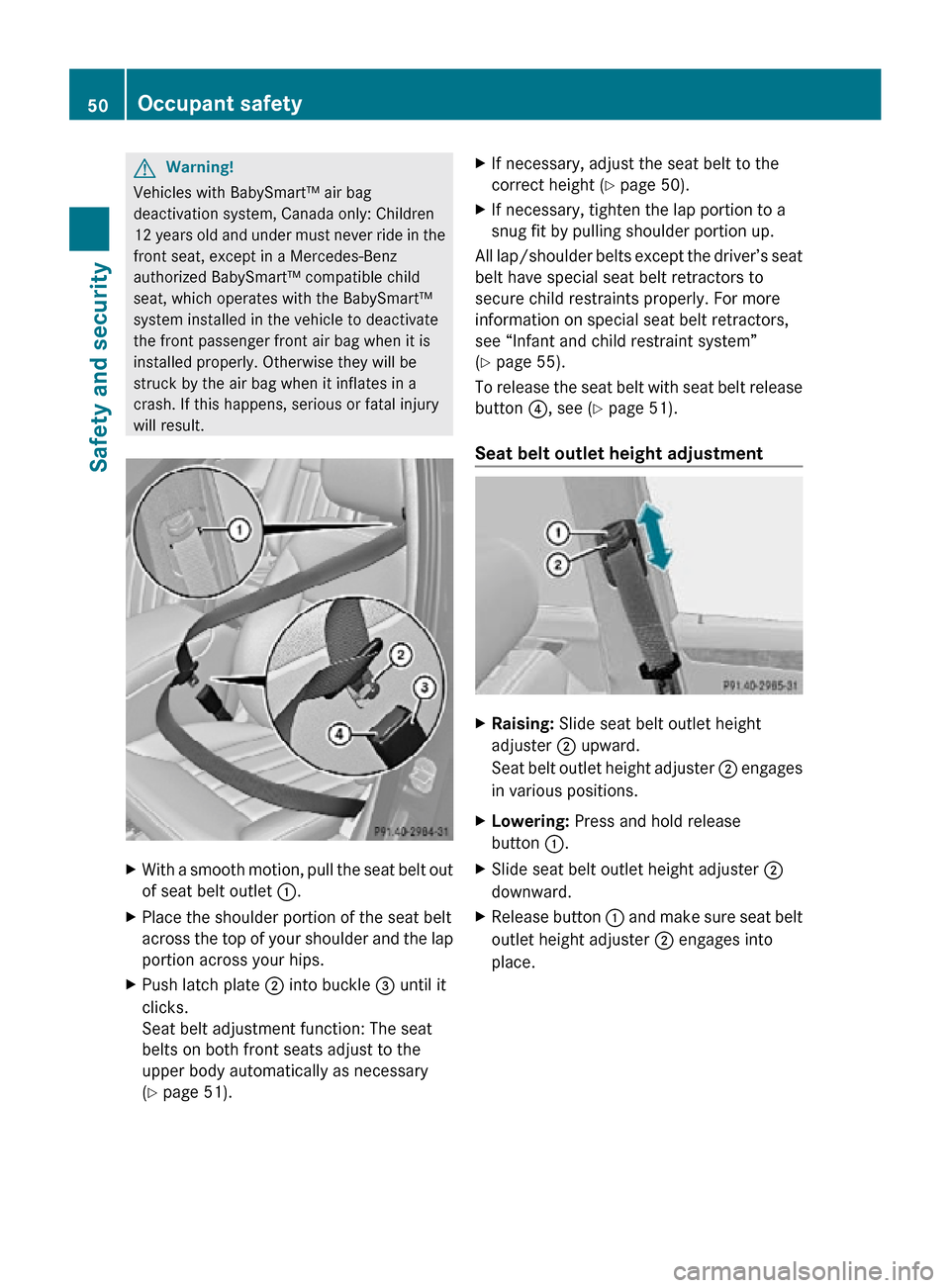
G
Warning!
Vehicles with BabySmart™ air bag
deactivation system, Canada only: Children
12 years old and under must never ride in the
front seat, except in a Mercedes-Benz
authorized BabySmart™ compatible child
seat, which operates with the BabySmart™
system installed in the vehicle to deactivate
the front passenger front air bag when it is
installed properly. Otherwise they will be
struck by the air bag when it inflates in a
crash. If this happens, serious or fatal injury
will result. X
With a smooth motion, pull the seat belt out
of seat belt outlet :.
X Place the shoulder portion of the seat belt
across the top of your shoulder and the lap
portion across your hips.
X Push latch plate ; into buckle = until it
clicks.
Seat belt adjustment function: The seat
belts on both front seats adjust to the
upper body automatically as necessary
(Y page 51). X
If necessary, adjust the seat belt to the
correct height (Y page 50).
X If necessary, tighten the lap portion to a
snug fit by pulling shoulder portion up.
All lap/shoulder belts except the driver’s seat
belt have special seat belt retractors to
secure child restraints properly. For more
information on special seat belt retractors,
see “Infant and child restraint system”
(Y page 55).
To release the seat belt with seat belt release
button ?, see ( Y page 51).
Seat belt outlet height adjustment X
Raising: Slide seat belt outlet height
adjuster ; upward.
Seat belt outlet height adjuster ; engages
in various positions.
X Lowering: Press and hold release
button :.
X Slide seat belt outlet height adjuster ;
downward.
X Release button : and make sure seat belt
outlet height adjuster ; engages into
place. 50
Occupant safetySafety and security
251_AKB; 4; 52, en-US
d2ureepe,
Version: 2.11.8.1 2009-03-23T09:22:52+01:00 - Seite 50
Page 53 of 364
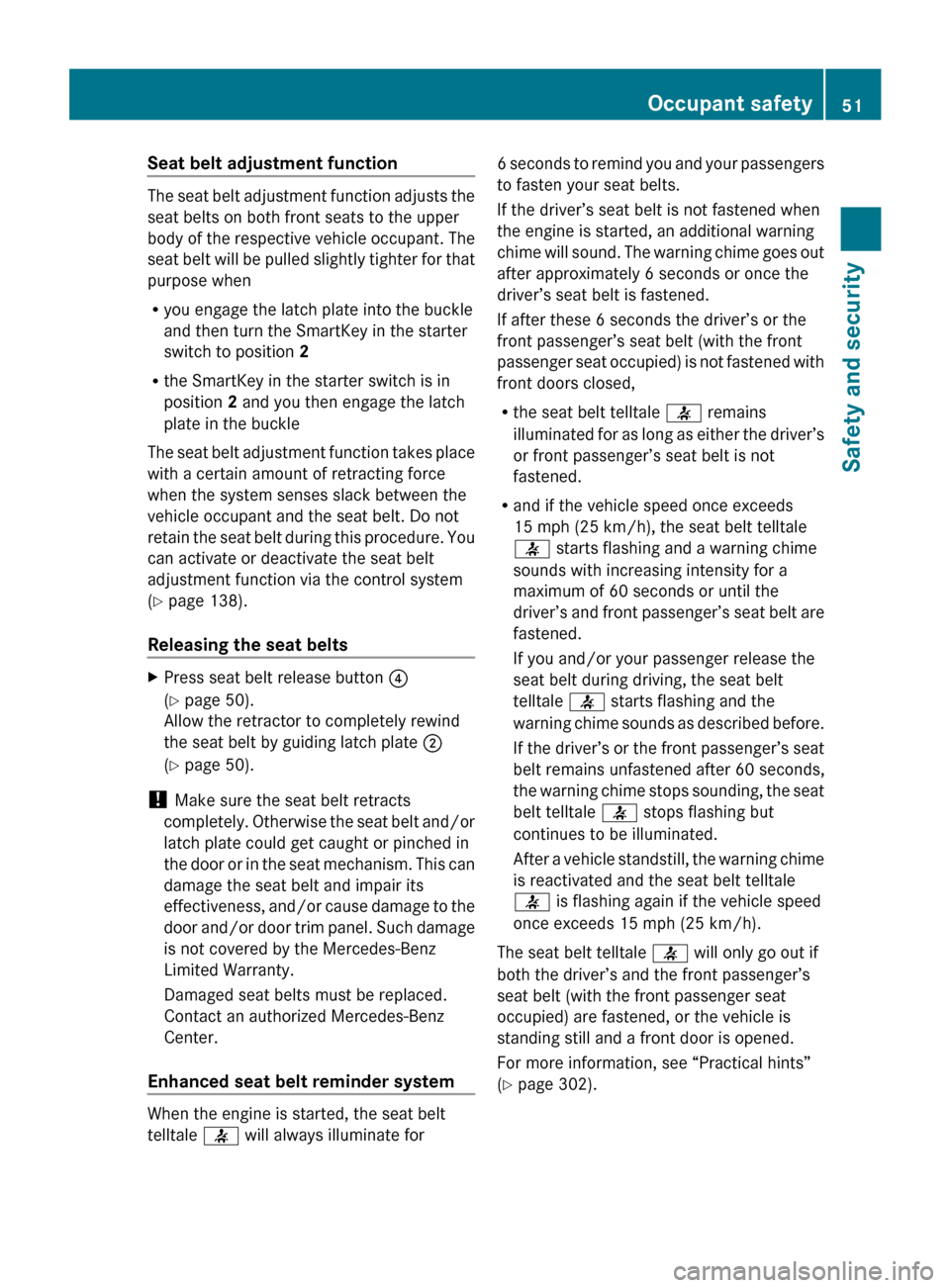
Seat belt adjustment function
The seat belt adjustment function adjusts the
seat belts on both front seats to the upper
body
of the respective vehicle occupant. The
seat belt will be pulled slightly tighter for that
purpose when
R you engage the latch plate into the buckle
and then turn the SmartKey in the starter
switch to position 2
R the SmartKey in the starter switch is in
position 2 and you then engage the latch
plate in the buckle
The seat belt adjustment function takes place
with a certain amount of retracting force
when the system senses slack between the
vehicle occupant and the seat belt. Do not
retain the seat belt during this procedure. You
can activate or deactivate the seat belt
adjustment function via the control system
(Y page 138).
Releasing the seat belts X
Press seat belt release button ?
(Y page 50).
Allow the retractor to completely rewind
the seat belt by guiding latch plate ;
(Y page 50).
! Make sure the seat belt retracts
completely.
Otherwise the seat belt and/or
latch plate could get caught or pinched in
the door or in the seat mechanism. This can
damage the seat belt and impair its
effectiveness, and/or cause damage to the
door and/or door trim panel. Such damage
is not covered by the Mercedes-Benz
Limited Warranty.
Damaged seat belts must be replaced.
Contact an authorized Mercedes-Benz
Center.
Enhanced seat belt reminder system When the engine is started, the seat belt
telltale
7 will always illuminate for 6 seconds to remind you and your passengers
to fasten your seat belts.
If the driver’s seat belt is not fastened when
the engine is started, an additional warning
chime
will sound. The warning chime goes out
after approximately 6 seconds or once the
driver’s seat belt is fastened.
If after these 6 seconds the driver’s or the
front passenger’s seat belt (with the front
passenger seat occupied) is not fastened with
front doors closed,
R the seat belt telltale 7 remains
illuminated for as long as either the driver’s
or front passenger’s seat belt is not
fastened.
R and if the vehicle speed once exceeds
15 mph (25 km/h), the seat belt telltale
7 starts flashing and a warning chime
sounds with increasing intensity for a
maximum of 60 seconds or until the
driver’s and front passenger’s seat belt are
fastened.
If you and/or your passenger release the
seat belt during driving, the seat belt
telltale 7 starts flashing and the
warning chime sounds as described before.
If the driver’s or the front passenger’s seat
belt remains unfastened after 60 seconds,
the warning chime stops sounding, the seat
belt telltale 7 stops flashing but
continues to be illuminated.
After a vehicle standstill, the warning chime
is reactivated and the seat belt telltale
7 is flashing again if the vehicle speed
once exceeds 15 mph (25 km/h).
The seat belt telltale 7 will only go out if
both the driver’s and the front passenger’s
seat belt (with the front passenger seat
occupied) are fastened, or the vehicle is
standing still and a front door is opened.
For more information, see “Practical hints”
(Y page 302). Occupant safety
51
Safety and security
251_AKB; 4; 52, en-US
d2ureepe, Version: 2.11.8.1 2009-03-23T09:22:52+01:00 - Seite 51 Z